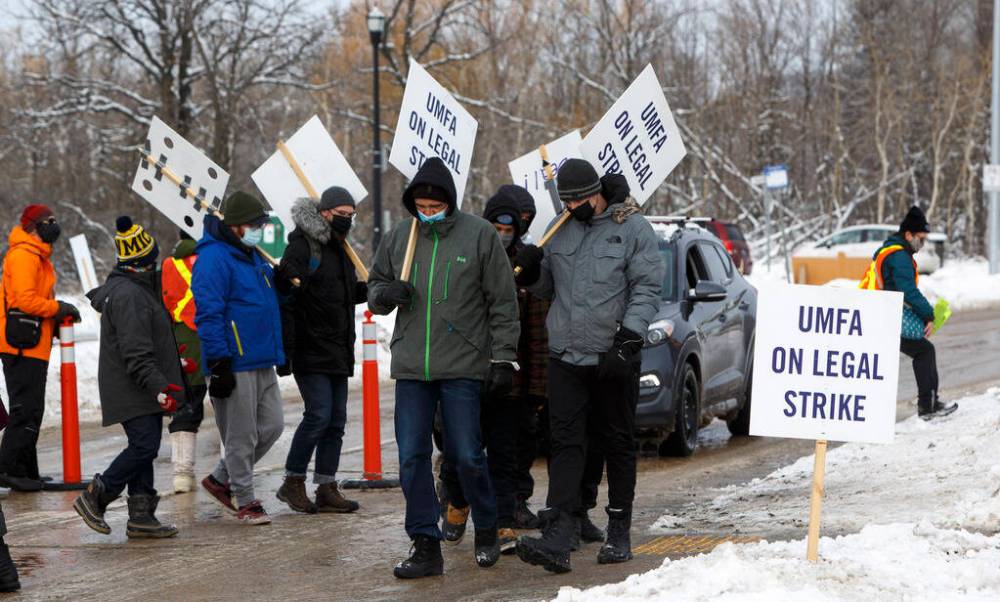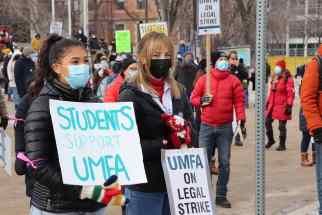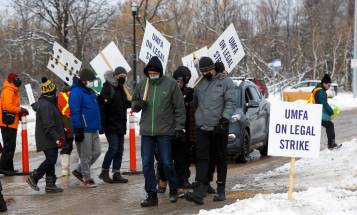Hard line on arbitration propels strike
Read this article for free:
or
Already have an account? Log in here »
To continue reading, please subscribe:
Monthly Digital Subscription
$0 for the first 4 weeks*
- Enjoy unlimited reading on winnipegfreepress.com
- Read the E-Edition, our digital replica newspaper
- Access News Break, our award-winning app
- Play interactive puzzles
*No charge for 4 weeks then price increases to the regular rate of $19.00 plus GST every four weeks. Offer available to new and qualified returning subscribers only. Cancel any time.
Monthly Digital Subscription
$4.75/week*
- Enjoy unlimited reading on winnipegfreepress.com
- Read the E-Edition, our digital replica newspaper
- Access News Break, our award-winning app
- Play interactive puzzles
*Billed as $19 plus GST every four weeks. Cancel any time.
To continue reading, please subscribe:
Add Free Press access to your Brandon Sun subscription for only an additional
$1 for the first 4 weeks*
*Your next subscription payment will increase by $1.00 and you will be charged $16.99 plus GST for four weeks. After four weeks, your payment will increase to $23.99 plus GST every four weeks.
Read unlimited articles for free today:
or
Already have an account? Log in here »
Hey there, time traveller!
This article was published 03/12/2021 (1467 days ago), so information in it may no longer be current.
One week ago, Arne Peltz, a respected labour lawyer and the mediator in the dispute between the University of Manitoba Faculty Association and the school’s administration, raised alarm bells about the union’s approach to negotiations. Mr. Peltz, who is well known as a fair and knowledgeable mediator and arbiter, accused UMFA of being unreasonable in refusing to participate in binding arbitration — a process that carries the promise of an expedited settlement — until non-monetary issues are dealt with through negotiation.
Mr. Peltz’s recommendation of binding arbitration should have been a victory for the union, and for students who are desperate to get back to classes. Most public-sector unions crave arbitration, particularly if they are negotiating with an austere or unreasonable employer — two qualities the union has assigned to the university.
It is also important to note that Mr. Peltz assured UMFA that any back-channel settlement directives issued by the Progressive Conservative government would not be considered during arbitration. Given the Tory government has, it appears, twice interfered in collective bargaining at the university, this should also have been seen as a major victory.

However, UMFA has so far declined to move forward. The union’s position is unusual and, in this instance, seems less than reasonable.
It is normal for outstanding non-monetary issues to be set aside to engage in binding salary arbitration. In this instance, UMFA wants to curb the authority of the school to order teachers to conduct classes online. It also wants staggered teaching schedules so that, as the union stated in a recent open letter, faculty members “aren’t teaching every single term for years on end without a break.”
Whether or not these positions are fair and reasonable is open to discussion. But what is at issue here is the union’s decision block a path to settling what it had identified as the most important issue — salary fairness — in pursuit of other non-monetary considerations.
UMFA has been consistently clear it seeks fair salaries that will allow the school to “attract and retain excellent teachers and researchers.” The university, which has fared very well in financial terms during the pandemic, appears to have the means to pay. Although it is hard to be definitive, it appears students have largely supported UMFA’s position, as displayed by public demonstrations against the school and in favour of the union.
It should be noted that UMFA has been dealt some very bad hands by the university and by the PC government that meddled in collective bargaining.
It should be noted that UMFA has been dealt some very bad hands by the university and by the PC government that meddled in collective bargaining. Last year, a court found government had “substantially” interfered in 2016 contract talks, a decision that was upheld on appeal. Now, UMFA is seeking $28.8 million in damages, and there is every reason to believe some sort of settlement will be forthcoming.
The striking faculty have long maintained what is good for them is ultimately good for students — an argument students seem largely to have supported. The U of M and the provincial government have not paid teachers salaries that keep the school competitive in the search for talent. Most of those affected hope this contract will begin to remedy that shortcoming.
However, UMFA is quickly approaching a point at which the current school year may become irreparably damaged. If it continues to refuse arbitration, it may no longer be able to say that what is good for them is good for students. If that happens, the union will lose not only public support, but also a major lever in future contract talks.














